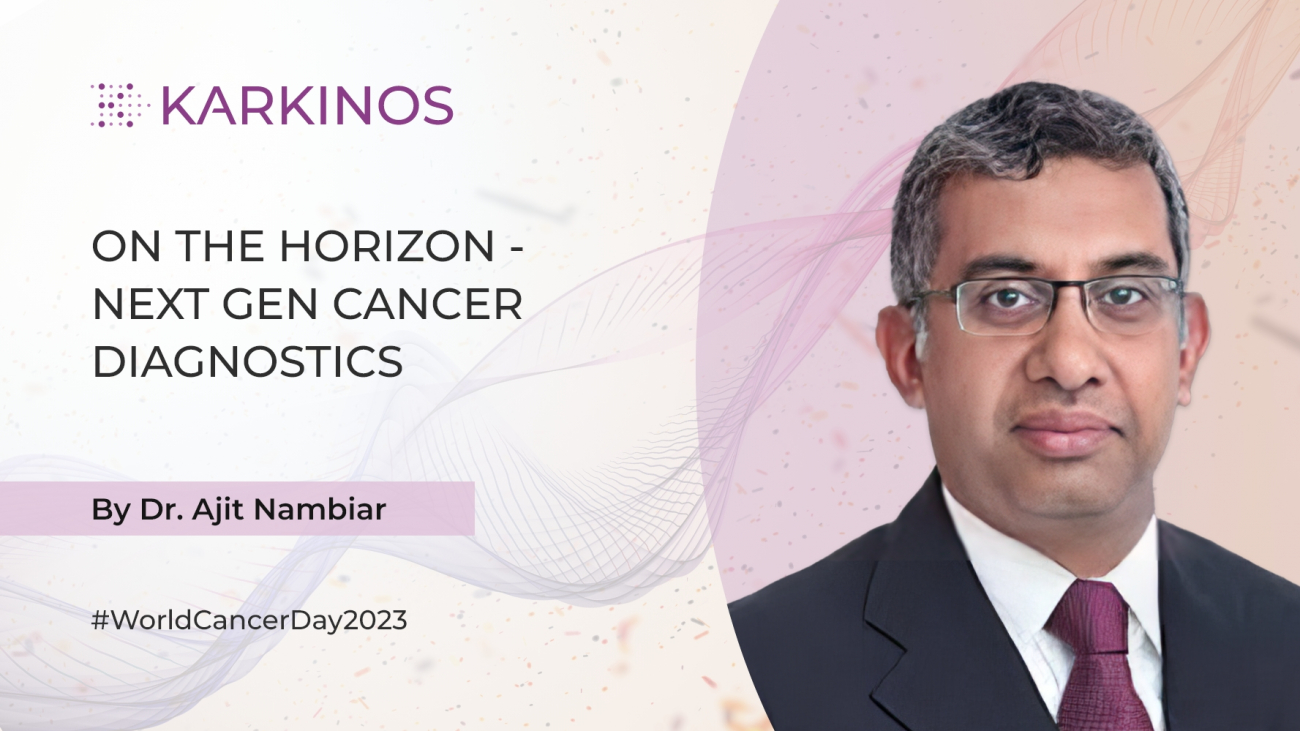Next gen diagnostics – On the horizon of new efficiencies in cancer care
By Dr. Ajit Nambiar, Director of Lab Services, Karkinos Healthcare
Diagnostics in cancer is undergoing a massive transformation. From conventional use of morphology studies to analyze tissues, cells, and blood to arrive at diagnosis, we have moved to the use of ancillary tools like immunohistochemistry and flow cytometry to decipher better and provide definitive diagnosis. This practice has been highly prevalent in the last two decades. However, in recent years, advances in molecular and digital pathology have reshaped pathology practice.
On this year’s World Cancer Day, February 4th, a global initiative to raise awareness about cancer and to encourage its prevention, detection, and treatment, and in line with the broad three-year campaign ‘Close the Care Gap’, it is important to highlight the progress in cancer diagnostics that have a profound impact on patient outcomes. The focus in 2022 was ‘Realising the problem.’ This year, for World Cancer Day 2023, the theme is ‘Uniting our voices and taking action,’ which will be followed by, ‘2024: Together, we challenge those in power’.
Among several efforts made by Karkinos Healthcare in cancer prevention and treatment, the company this year on World Cancer Day will highlight its action and commitment in not only raising awareness and promoting education about cancer, its prevention, early detection, and treatment but also bring to fore the progress in the division of cancer pathology.
Karkinos, therefore, is committed to increase the understanding of cancer as a disease and will drive progress in reducing the impact of cancer, including increasing funding for research, improving access to early diagnosis, and providing better support and care for those affected through its Distributed Cancer Care Network Model.
Cancer is a genetic disease. Which means understanding mutations in DNA and genes would be paramount to deciphering the drivers of cancer conditions. There are drugs that could block the pathways which cancer cells use. Research in developing such drugs based on identifying actionable mutations is propelling the practice of precision oncology. As cancer is not a single gene entity-driven disease. The drivers could be many, even in the same cancer type. From the initial practice of doing single genes using PCR, it is deemed now to do a parallel analysis of multiple genes.
Next Generation Sequencing (NGS) is the new buzz word in oncology practice. Regarded as the next horizon in cancer diagnostics, Next-Generation Sequencing (NGS) is gaining importance as it allows for a comprehensive analysis of an individual’s tumor DNA, providing insights into the specific genetic changes driving the tumor and informing treatment options. NGS can detect genomic alterations at high resolution and detect them faster and more economically than traditional sequencing methods. This leads to improved accuracy in diagnosis and personalized treatment plans, leading to better outcomes for patients.
NGS technologies have enabled simultaneous analysis of a broad spectrum of genomic alterations from single nucleotide variations, insertion, deletions, copy number variations and fusions across multiple genes. The Comprehensive Genome Profiling (CGP) enables information of well over hundreds of genes and thereby get information on actionable mutations. Also, importantly knowledge about resistant genes, as well as gene-gene interactions, which can influence treatment plans, adds further information on prognosis and treatment paradigms. Gene signatures like tumor mutational burden, microsatellite instability and homologous recombination defects provide further information on use of immunotherapy and specific chemotherapy respectively. Because of its high throughput ability in analyzing millions of DNA sequences at once, allowing for more comprehensive and efficient analysis of cancer genomes, pathologists have started exploring this as a reliable diagnostic method.
Also, the ability to do Whole Genome Sequencing (WGS) will help decipher the genomic landscapes with greater relevance to the Indian population and help refine the genetic panel testing. The cancers in this country have their own genomic footprint that could be different from what we see in the west. Karkinos Healthcare, hence, believes in investing in the Whole Genome Sequencing (WGS) method to enable understanding of the Indian genomic cancer map. The journey in cancer genomics will uncover new biomarkers that can enhance early detection and delivery of care. We are certain that collaborative efforts across science, including drug discovery for mutations pertinent to the country, will enhance the level of care provided.
Bearing in mind all these pathology related requisites in cancer care, Karkinos Healthcare has established the Advanced Center for Cancer Diagnosis and Research Center (ACCDR) and Centre for Biomedical Research, Innovation and Commercialisation in Cancer (BRIC) in Kochi, Kerala. These centers will leverage capabilities and spearhead the cancer care delivery with robust, evidence-based, and data-supported protocols bringing in a generational shift in the way cancer care is delivered in India. Karkinos Healthcare will leverage NGS for early detection of cancer, when they are more treatable and have a higher likelihood of successful outcomes. The company will undertake sustained initiatives to explore NGS in cancer diagnostics, and will constantly leverage its continued development in furthering our understanding and treatment of cancer as a disease.
A major challenge in cancer is the early-stage diagnosis of the disease. Also finding early longitudinal progression in each patient, much earlier than clinical symptomatology or what imaging can pick, is the need of the hour. Liquid biopsy is slowly but surely helping identify critical biomarkers. Identifying from cfDNA, ctDNA and recently from exosomes are emerging as promising biomarkers that will come into clinical applications as technology and standardizations improve.
Scanning of slides vastly changed the workflows from the traditional use of microscope. The pathology images being digitalized meant a lot more can be achieved from the given slides. Most importantly the field of artificial intelligence and computational pathology through artificial neural networks and machine learning can shed more light on patterns of tumor, tumor microenvironments and the stromal spatial relationships helping predict prognosis and support treatment decision making.
Karkinos Healthcare’s contribution through amalgamation of data from screening, pathology, imaging, molecular analysis, and digital scanning will help build robust data that can revolutionize cancer treatment delivery in India. The vision of the next generation lab is to be a world-class referral lab transforming patient care and research.

 ABOUT Dr. AJIT NAMBIAR
ABOUT Dr. AJIT NAMBIAR